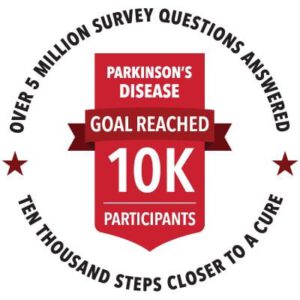This post comes to us from our friends at the  customers and research participants the opportunity to access their information if they want it. This post from the Michael J. Fox Foundation attempts to cover the different approaches to informing participants about their results.
customers and research participants the opportunity to access their information if they want it. This post from the Michael J. Fox Foundation attempts to cover the different approaches to informing participants about their results.
Researchers need to know if study participants have certain genetic mutations to understand how those lead to disease. But do the participants have to know if they have a mutation?
Parkinson’s disease (PD) researchers published last month in Genetics of Medicine the different answers to that question among sites investigating mutations in the LRRK2 gene, the greatest known genetic contributor to PD.
Investigators from The Michael J. Fox Foundation-sponsored LRRK2 Cohort Consortium authored the letter to the editor. The consortium unites research groups from nine countries on four continents to learn more about LRRK2 and speed collective efforts closer to practical therapies for patients.
In general, mutations in the LRRK2 gene account for less than five percent of PD cases, but that number jumps in certain ethnic populations; LRRK2 mutations are associated with 18 to 40 percent of PD cases among those of Ashkenazi Jewish or North African Berber descent. Adding to the complexity is the unknown “penetrance” or association between a mutation and disease onset; estimates range from 24 to 80 percent.
Currently there are no proven preventive or disease-modifying strategies for Parkinson’s, so information of one’s PD genetic profile may not influence any direct action.
“The study design raised an ethical question,” according to the authors. “Should the genetic testing results be reported to participants?” People with Parkinson’s and their family members without PD were screened for a LRRK2 mutation, and researchers conducted a more thorough investigation on mutation carriers and a subset of those without mutations.
Sites in the United States did not offer genetic results to participants with PD, but Israeli sites concluded it would be unethical not to provide such information. They informed all PD participants who requested their results.
Most study sites did not offer results to non-PD participants unless they first received genetic counseling. The Toronto team stopped offering these results after they felt participants had trouble grasping the information.
The letter’s authors outline the arguments for each side: Knowing one’s genetic risk may be distressing. However, many feel that this data is the property of the participants and they should be allowed to receive or refuse it as they prefer.
“It is true that presently there is no definitive action one can take to offset genetic risk for Parkinson’s disease,” said Brian Fiske, PhD, vice president of research programs at The Michael J. Fox Foundation. “However, individuals who do choose to learn their genetic status can play an important role in teaching researchers about the disease and possible treatments.”
The MJFF-led Parkinson’s Progression Markers Initiative is enrolling people with a LRRK2 mutation. The observational, biomarker study is recruiting people of Ashkenazi Jewish descent – because of greater prevalence – with Parkinson’s or with a first-degree relative with PD. Learn more about PPMI.
You can also join the 23andMe’s Parkinson’s Disease Research Initiative by contributing demographic and medical history information and a DNA kit. Learn more.